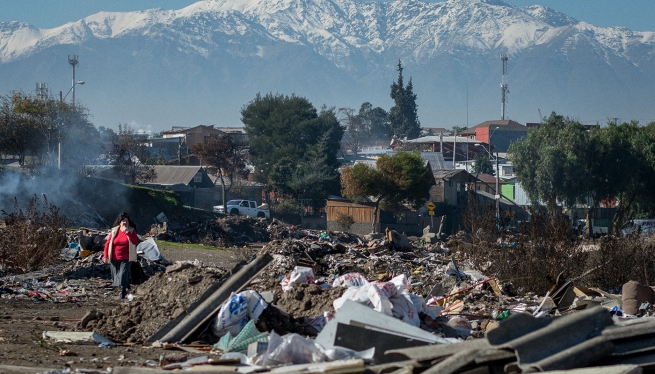Informal settlements, camps or shantytowns, as they used to be called, are characterized by the "occupation" of land followed by the construction of homes made of light building materials with, however, no access to basic urban utilities such as electricity, drinking water and sewage.
The Silva Henríquez Catholic University (UCSH), under the charisma of Don Bosco and Cardinal Raul Silva Henríquez, strives to address this issue in the "Camp Giappone."
Since 2015, volunteers offer various services to the students housed at the camp: schooling, adult literacy, legal counseling; they are also working on building water and sewage services for housing.
"Camp Giappone" was established in 2010. It is located in Santiago, on the borders of Maipú and Cerrillos, at the center of a desert site used as a micro garbage dump or landfill. About 40 families are grouped in 12 houses, where about 120 people live. Women are usually at the head of the families.
It is a place where you breathe segregation and inequality. Both housing construction and livelihood are born from the same landfill as colonists gather building material for their homes, firewood for cooking and heating, and objects they repair and later sell in nearby fairs.
"It's not that they want to live that way; it's their job." "It's a precarious and unworthy way of life. There are no other alternatives for them; they do not want to live that way, it's their turn," he adds.
The work of UCSH students is highly appreciated by the people of the Camp. In the students, they have found real support for their dignity, support they have been waiting for for years and have never received from the State.
Cile - "Non è che vogliono vivere in questo modo, è il loro turno": volontari al servizio dei poveri
(ANS - Santiago) - In base al censimento nazionale preparato da TECHO nel 2016, 38 mila 770 famiglie vivono in 660 campi in tutto il Cile, delle quali 81 si trovano nell’area metropolitana, soprattutto nelle regioni di Lampa, San José de Maipo e Maipú.
Gli insediamenti informali, campi o baraccopoli, come venivano chiamati tra il 1960 e il 1980, si caratterizzano per l’ “occupazione” della terra e conseguente costruzione con materiali leggeri di case, che però non hanno accesso ai servizi urbani di base come elettricità, acqua potabile e fognature.
L'Università Cattolica Silva Henríquez (UCSH), sotto il carisma di Don Bosco e il cardinale Raul Silva Henríquez, si prodiga per affrontare questo problema nel “Camp Giappone”. Dal 2015 i volontari, presso gli studenti del campeggio, supportano diversi servizi: corsi di recupero, alfabetizzazione degli adulti, consulenza legale per le diverse procedure; inoltre si sta lavorando sulla costruzione di servizi sanitari per l'edilizia abitativa.
Il “Camp Giappone” è nato nel 2010. Si trova a Santiago, ai confini dei comuni Maipú e Cerrillos, al centro di un sito desertico utilizzato come micro spazzatura. Circa 40 famiglie sono raggruppate in 12 case, in cui vivono circa 120 persone. Le donne sono solitamente capi di famiglia.
È un luogo in cui respiri la segregazione e la disuguaglianza. La costruzione delle case e anche il sostentamento nascono dalla stessa discarica. Là i coloni raccolgono materiali per le loro case, legna da ardere per la cottura e per il riscaldamento, oggetti che riparano e poi vendono nelle vicine fiere.
"Non è che vogliono vivere in questa maniera, è il loro lavoro". "È un modo precario e indegno di vita. Per loro non esistono altre alternative; non è che vogliono vivere in questo modo, è il loro turno", aggiunge.
L'opera degli studenti UCSH è altamente apprezzata dalle persone del Camp. Hanno trovato in loro un reale sostegno alla propria dignità, una situazione attesa da anni e che non hanno mai ricevuto dallo Stato.


